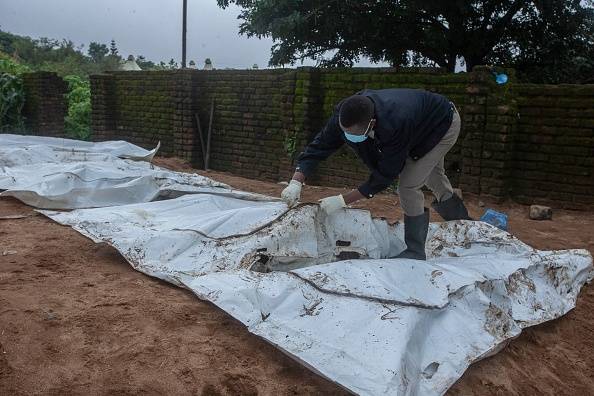Minister of Electricity and Energy Kgosientsho Ramokgopa
Minister of Electricity and Energy Kgosientsho Ramokgopa has bowed to legal pressure and withdrawn a gazetted determination for South Africa to procure 2 500 megawatts of new nuclear energy capacity.
He announced his decision to withdraw the section 34 determination under the Electricity Regulation Act, which he signed off in January, at a special media briefing in Pretoria on Friday, citing inadequate public participation.
The minister said his decision was to preserve “the integrity of the nuclear procurement process, especially given its chequered history”.
He noted that the government’s previous attempt to procure nuclear energy was “soiled in … a veil of secrecy and not understanding essentially the procurement process” and that this alone had undermined the ability of the country “to be able to benefit from this clean, reliable and efficient source of energy”.
Ramokgopa’s withdrawal comes on the eve of a court case, which was set down to be heard in October, initiated by the South African Faith Communities Environment Institute (Safcei) and Earthlife Africa. This was to review and set aside the minister’s determination on the basis that it is unlawful and unconstitutional as the process behind it was procedurally unfair.
“We appreciate that the minister had considered our arguments against the incomplete public participation on the fulfilment of suspensive conditions as that had to go through comments by the public,” said Makoma Lekalakala, the director of Earthlife Africa Johannesburg. “It’s only when the Integrated Resource Plan 2023 is gazetted that we can think of how the energy mix should look.”
“The announcement by the minister of energy that he has conceded to our court challenge on the procurement of new nuclear, is a victory indeed for democracy and for the public living in South Africa,” said Francesca de Gasparis, the executive director of Safcei.
As a faith-based NGO, transparency and ethical decision-making “needs to be done by our government on our behalf” in all of its energy planning, she said. “Hearing this from the minister is good news indeed.”
In September 2021, following an initial public consultation process earlier that year, the National Energy Regulator of South Africa (Nersa) gave a conditional concurrence with a draft nuclear determination signed by the former minister of mineral resources and energy, Gwede Mantashe, in March 2020.
Its decision was subject to three suspensive conditions. These required the minister of energy to provide further information to show that the build was affordable, that technological developments were taken into account and that 2 500MW of new nuclear electricity generation capacity was rational.
“The department did all they could to ensure this was satisfied, and was successful in producing reports that answered those three suspensive conditions, and submitted those reports to Nersa,” Ramokgopa pointed out.
“It evaluated those submissions and then arrived at a determination that these are satisfactory and, on the basis of that, it decided that, ‘Now you’ve got the concurrence, you can proceed.’”
During that period, the transition related to the department that carries the responsibility of section 34, with the introduction of the ministry of electricity, “which meant that the responsibility of executing that concurrence sat with the minister of electricity”, he said, saying he was satisfied with the process arrived at by his predecessor.
But the legal process that Earthlife Africa and Safcei initiated was substantive, he noted.
“What these parties are arguing is … that, yes, there was a public participation process. That public participation process resulted in Nersa issuing the concurrence, subject to the suspensive conditions being met,” Ramokgopa said.
“The parties are saying, when the department came back with a report on how they’re going to meet the suspensive conditions, instead of Nersa sitting on its own and applying its mind, and giving the final concurrence, they are arguing that Nersa had an obligation to subject that report of suspensive conditions to another proce ss of public participation.
“I said to the team, as a minister, we carry the responsibility of ensuring this process we are undertaking is subject to the highest levels of public scrutiny, including our response in relation to the conditions.”
On the back of this, Ramokgopa said it was proper that they are able to extend an opportunity to the applicants and other parties to evaluate, examine, critique and respond to their report relating to how they are going to meet the suspensive conditions.
“As a minister, I agree with these applicants. I agree with Earthlife Africa and Safcei that Nersa should have subjected that process to a public participation process. The last thing we want to do is a major build programme on the back of suspicion that the department and the government is hiding something from the public.”
On why he had not considered the need for further public participation before gazetting the determination, Ramokgopa explained: “The issue of concurrence is in the Nersa domain. It has nothing to do with the ministry; it’s an independent body that regulates this space and the minister can’t enter into that space.”
“The only time we got to know, and were alerted that that process was not subject to a public participation process, is when the papers were filed and the minister says we’re agreeing with them.”
He noted that there was a “penalty to be paid” because of his withdrawal decision, which meant that the procurement process would be delayed for three to six months.
“We are happy to delay the process so that we’re able to allow for each and every part of the country who wants to add a voice in how we’re going to procure this process, for them to be given the opportunity to be able to make that submission.”
This, he emphasised, was to protect the integrity of the process and cement its transparency “so that there’s general public confidence in the work that we are doing”.
Nuclear “is the future”, the minister concluded. “Increased nuclear generation capacity, in addition to what we have at Koeberg, is going to happen … What we want to really protect here is the integrity of the process and that is why we’re taking one step back to allow us to take two steps and multiple steps going forward.”
De Gasparis said that while the minister continued to assert that South Africa needed new nuclear, he also conceded that energy planning needs to be done in an effective way that allows for public participation and that looks at the costs of nuclear energy within the energy mix, including the IRP.
“We would like to see the minister now introduce the integrated energy plan, the legislation that is part of the Energy Act, and really look at the true costs of nuclear energy. We believe the minister, if he sticks to his word, will make the right decision for our energy future and there will not be any nuclear energy coming our way down the line,” she added.





















Discussion about this post